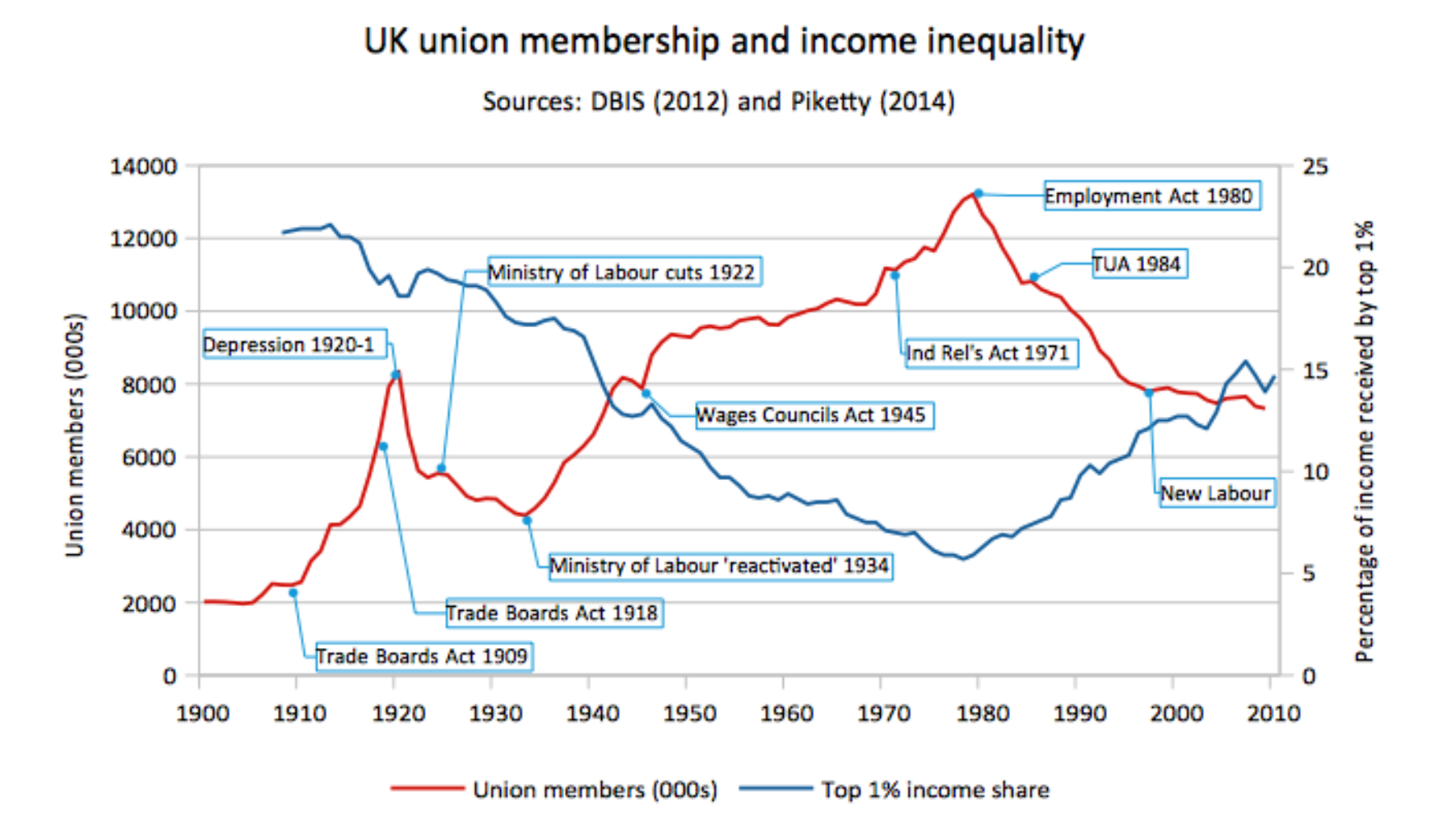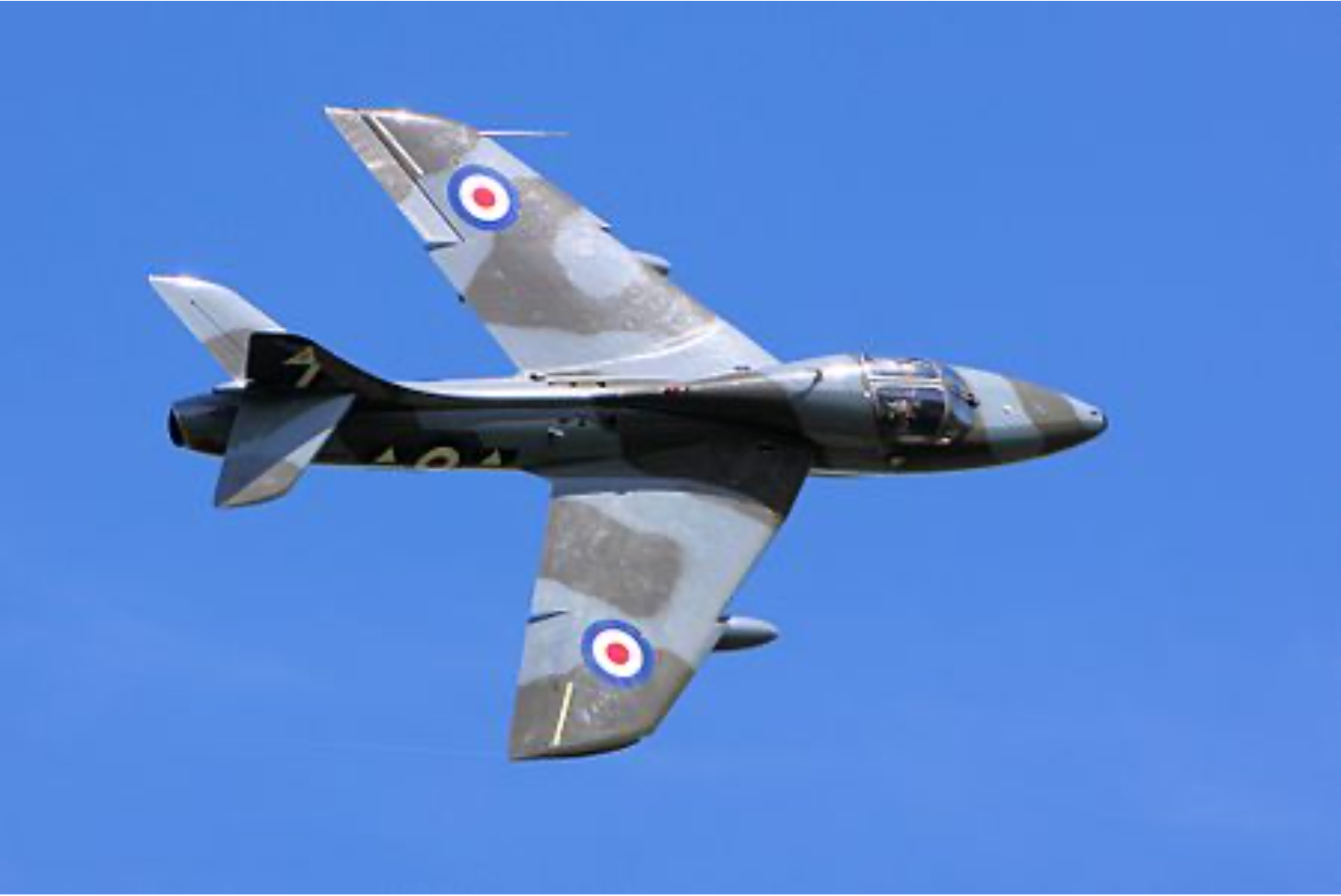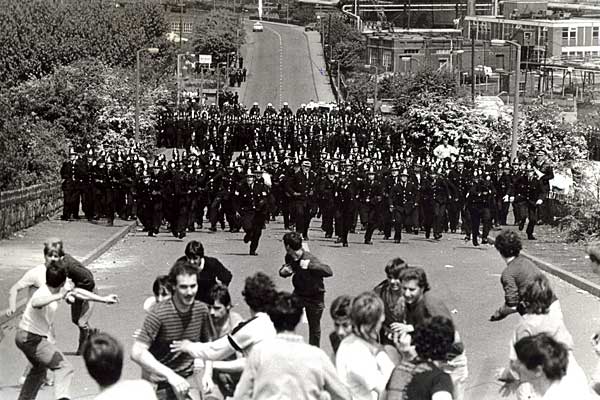Trade unions are democratic organisations of labour, aggregating the power of labour into a singular unifying force – which collectively bargains on behalf of their membership for better working conditions from their employers. Unions ballot their members to democratically organise strike action, which brings the capitalist to the table, from which point the union can collectively bargain for better conditions. This mechanism can be extended to offer a vehicle for unionised workers to resist imperialism and the military-industrial complex.
Generally, as trade union membership density within a population decreases, the share of income of the capitalist classes increases. Weak unions mean working conditions are exposed to the erosive anarchy of the free-market; incessant cost minimisation by the capitalistic firm, in the name of profit maximisation. Strong unions defend labour in the tug of war with capital, fighting to return the extracted surplus value [by the hands of the capitalist] to the working-classes.

Equality in Britain peaked in 1978, a time when the bottom 90% of workers took home a 72.2% share of all income in that year, since then, this share has experienced a downwards trend. The fall of income share of the bottom 90% coincides with a downwards trend in trade union membership in Britain since 1979, or in other words, since Thatcher came to power in 1979 and proceeded to smash the unions (see Figure 1). Furthermore, the downward trend of union membership density coincides with an upwards trend in the share of percentage income of the top 1% (see Figure 1). An IPPR report found that since 1979, trade union membership density has halved and the proportion of workers protected by a collective bargaining agreement has fallen 2/3.
Tony Benn pointed out in his People Before Profit speech: “Thatcher was a much cleverer woman than we give her credit for… she knew perfectly well, the strength of the labour movement lay in three sources of power… the unions… local government… and the public sector”. Thatcher reduced local government democracy, centralising power in Westminster, thus disempowering the voice of local communities in local politics. She privatised swathes of public assets and atomised public sector workers, thus diminishing their sense of community and solidarity.
The IPPR report found that union membership is lowest amongst those who have the most to gain from it; “low-skilled, low-paid workers who lack power in the labour market”. Only 13.5% of private sector workers are unionised, with the remnants of unionisation concentrated in what remains of the public sector. The private sector workers of today, in natural monopolies which were once publicly owned, are therefore unlikely to be unionised – a major shift to insecurity for swathes of the workforce. In addition, unions are almost completely absent in many low-pay industries – such as the gig economy.

Thatcher waged lawfare against the miners and the trade unions, or as she called them, “the enemy within”. She aimed to crush the spirit of the British working-classes, to put capital in the driving seat of the economy, and hog-tie labour in the boot. Thatcher’s Employment Act 1980 (see Figure 1) restricted the definition of lawful picketing to strictly: “those who were themselves party to the dispute and who were picketing at the premises of their own employer”. This was a catastrophic blow to the power of the unions, effectively outlawing traditional trade unionism. In addition, this redefinition rescinds the right to strike in solidarity with class allies from overseas, stunting the potential for international working-class solidarity. The effect is a compartmentalisation of the British working-classes, segmenting and isolating them from the wider working-class – reducing the strength and confidence of the working- classes as a whole.
As Len McCluskey recalls in Why You Should Be A Trade Unionist? The British Rolls- Royce workers of East Kilbride stood shoulder-to-shoulder with their Chilean class allies. They striked their contracted maintenance on the Chilean air force’s Hawker Hunter jets (see Figure 2). This resistance to imperialism displeased Pinochet, so by extension, it displeased Thatcher. Nowadays, such borderless working-class solidarity risks union funds being seized by the British state, leaving the rights of millions of workers exposed to erosion; strike action can no longer be risked.
Thatcher enshrined a power imbalance into law, layering bubble wrap around the trade between gangster states and arms dealers, while slashing the capacity for international working class solidarity – that’s the reality of ’cutting the red tape’ under capitalism. Under dictatorship of the bourgeoisie, law is written in the interest of the bourgeoisie. Thus, a borderless system of oppression emanates, one which isolates and exploits the disunited working-classes of the world, perpetually evolving to stunt working-class solidarity.
A recent example of anti-war withdrawal of labour can be seen with the dockers of L’Unione Sindacale di Base (USB) at the port of Livorno, Italy. USB members refused to load arms destined for Israel, frustrating the war supply chain. USB workers acted in solidarity with their class allies, besieged by precision missiles in the Gaza strip. This is an impossibility for British dockers under the Employment Act 1980 (see Figure 1).
Thatcher is conventionally known for bringing neoliberalism to Britain (the presiding economic doctrine for the last 40 years); the privatisation of public assets and anti-trade union reforms, and the resulting destruction of the labour movement. However, perhaps her most insidious and surreptitious attack on the wider working class was criminalising the potential for overseas working-class solidarity. As a result, the inconveniences posed by organised labour disappeared. The British military-industrial complex grew covertly, and its exports boomed throughout neoliberal capitalism and lust for liberal interventionism, unabashedly profiting through the segmentation and suffering of the working class.
George Hughes, is a member of the YCL’s Edinburgh branch



